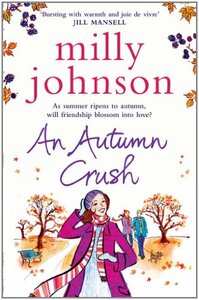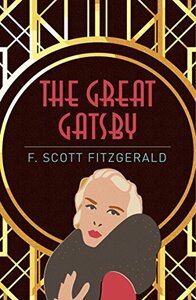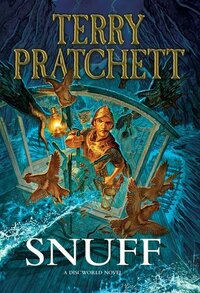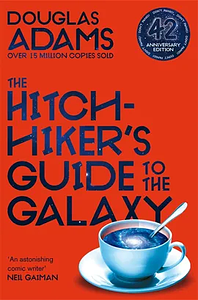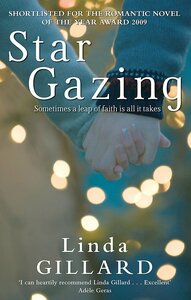You need to sign in or sign up before continuing.
Take a photo of a barcode or cover
patchworkbunny's Reviews (2.12k)
So I got so wrapped up in Windfall that I went straight onto the next book. By now you've probably lost all hope for Jo and David and are looking in the direction of Lewis again. Unfortunately, they're in the middle of a djinn uprising and things aren't looking good for the wardens, or even the human race. Mother Earth is waking up and she's not too happy with what humans have done in her absence. Great pacy stuff and I think her characters have enough dimensions to not be too predictable.
Garet is a jewellery designer in New York who lost her mother in a tragic car crash. She never got to hear her mother's last words over the noise of the jaws of life but the moment is scarred onto her memory. When her father's gallery experiences financial difficulties, a pair of Pissarios are stolen in suspicious circumstances leaving him in hospital. That same day, Garet had accepted an odd request to open a silver box that bared the same crest that was on her mother's signet ring.
From the moment she opens the box, nothing is the same. Garet slowly learns more about her mother's past and discovers that she's not just a normal woman but has hidden powers and great responsibility.
There were parts of this book that I loved, I thought Garet was a well-rounded, realistic character for the main. Many of the supernatural characters were based on those in myth and it was fun seeing them adapted to a modern setting however their speech sometimes came across and clichéd and cheesy. It was as if the authors had decided they should speak in an old-fashioned manner but didn't research what that would be. As the characters had assimilated themselves into the modern world and passed as normal, it doesn't make any sense that they wouldn't speak like everyone else.
The book is co-written by husband and wife team, Lee Slonimsky and Carol Goodman, and I wonder if that explains my mixed feelings. There are certainly two different styles, one I much prefer.
I was disappointed that the imagery of the swan didn't pan out into anything more meaningful. It felt a little like it had got forgotten or someone was just trying to be clever with the signet ring/cygnet connection.
There is a sequel out now, The Watchtower and I liked Black Swan Rising enough to consider reading more.
From the moment she opens the box, nothing is the same. Garet slowly learns more about her mother's past and discovers that she's not just a normal woman but has hidden powers and great responsibility.
There were parts of this book that I loved, I thought Garet was a well-rounded, realistic character for the main. Many of the supernatural characters were based on those in myth and it was fun seeing them adapted to a modern setting however their speech sometimes came across and clichéd and cheesy. It was as if the authors had decided they should speak in an old-fashioned manner but didn't research what that would be. As the characters had assimilated themselves into the modern world and passed as normal, it doesn't make any sense that they wouldn't speak like everyone else.
The book is co-written by husband and wife team, Lee Slonimsky and Carol Goodman, and I wonder if that explains my mixed feelings. There are certainly two different styles, one I much prefer.
I was disappointed that the imagery of the swan didn't pan out into anything more meaningful. It felt a little like it had got forgotten or someone was just trying to be clever with the signet ring/cygnet connection.
There is a sequel out now, The Watchtower and I liked Black Swan Rising enough to consider reading more.
After splitting with her husband, Juliet is in need of a flatmate and won't settle for anyone she can't be friends with. After a string of awful applicants, Floz walks through the door and the two women are soon firm friends. Juliet's brother, Guy, takes an instant fancy to Floz but a series of misunderstandings cause a rift between the two. Guy's best friend, Steve has had a crush on Juliet since primary school but hides behind a mask. Juliet thinks Steve is a knob.
It's not rocket science to guess how things play out but there's a few ups and downs along the way and some lessons to be learned. The book started off well with an instant connection to the characters and it had the ability to both entertain and move me.
This is the first novel I've read by Milly Johnson and at first I was worried that she was giving everything away. It was clear she was telling the story for each character's perspective and I generally find that style gives too much away. In An Autumn Crush, not everyone is being completely honest to themselves which means there are some surprises to be had by the end.
It's not rocket science to guess how things play out but there's a few ups and downs along the way and some lessons to be learned. The book started off well with an instant connection to the characters and it had the ability to both entertain and move me.
This is the first novel I've read by Milly Johnson and at first I was worried that she was giving everything away. It was clear she was telling the story for each character's perspective and I generally find that style gives too much away. In An Autumn Crush, not everyone is being completely honest to themselves which means there are some surprises to be had by the end.
Jake is minding his own business after a night in a bar when two men grab him and cut off his ring finger. Jake's just a normal guy and believes that it's just a random act of violence but the police aren't so sure. When his wife goes missing, he must start digging up the past and throw himself into a world of violence.
It's a dramatic start and the plot is fairly fast paced but after a while I just didn't care whether or not the main characters died or not. It's much more action based than introspective so it's hard to connect. The idea of a normal man being targeted out of the blue could have been an intriguing story but it soon turns out that there's a whole lot of back-plot which makes it less interesting to me.
I'm sure there are plenty of readers who will devour Already Gone. It definitely has the feel of an action flick, the lack of character development would make it perfect for the big screen. I don't know if it's the slightly mysterious side to Gabby that made him the most well-rounded character but I found myself wanting to know more about him and carried on for his sake.
It's a dramatic start and the plot is fairly fast paced but after a while I just didn't care whether or not the main characters died or not. It's much more action based than introspective so it's hard to connect. The idea of a normal man being targeted out of the blue could have been an intriguing story but it soon turns out that there's a whole lot of back-plot which makes it less interesting to me.
I'm sure there are plenty of readers who will devour Already Gone. It definitely has the feel of an action flick, the lack of character development would make it perfect for the big screen. I don't know if it's the slightly mysterious side to Gabby that made him the most well-rounded character but I found myself wanting to know more about him and carried on for his sake.
Hands up if you remember cap guns, cigarette candy and the screech of a tape loading to play your favourite pixellated computer game? If so, you'll find this book a nostalgic, fuzzy-feeling and amusing trip down memory lane. If you follow @meandmybigmouth on Twitter, then you'll have a good idea of the style of writing.
I kept reading "if you're over 30" or "readers under 30 won't remember" and thinking, "I remember this stuff" only to remind myself that I will be turning 30 next month. Maybe this book, more than anything else, has hit that home and I'll stop thinking I'm 25 still. The things of my youth are sadly no longer with us and some of it I never even had the pleasure of experiencing. I don't think I even had a VCR until I left for university!
If you're my age or older, I think you'll love it. It was briefly passed round at work and inspired a conversation about dog poo (our token young person was fortunately out of the office). If you want to know what on earth your parents keep reminiscing about, this could possibly help too!
I admit, I don't remember everything in this book but it was nice to learn about the things that became extinct before my brain cells were fully functioning. I really do think this sort of stuff should be included in the curriculum, history is not just about war but about the little things that changed everyday life. And yes, Opal Fruits are still Opal Fruits in my mind...
I kept reading "if you're over 30" or "readers under 30 won't remember" and thinking, "I remember this stuff" only to remind myself that I will be turning 30 next month. Maybe this book, more than anything else, has hit that home and I'll stop thinking I'm 25 still. The things of my youth are sadly no longer with us and some of it I never even had the pleasure of experiencing. I don't think I even had a VCR until I left for university!
If you're my age or older, I think you'll love it. It was briefly passed round at work and inspired a conversation about dog poo (our token young person was fortunately out of the office). If you want to know what on earth your parents keep reminiscing about, this could possibly help too!
I admit, I don't remember everything in this book but it was nice to learn about the things that became extinct before my brain cells were fully functioning. I really do think this sort of stuff should be included in the curriculum, history is not just about war but about the little things that changed everyday life. And yes, Opal Fruits are still Opal Fruits in my mind...
So, The Great Gatsby. It's set in a superficial Long Island community and is narrated by Nick who is somewhat an outsider in a smaller, less glamourous house next door to Mr Gatsby. He seems to do lunches and goes on excursions with his cousin and her friends and not a lot else. When Gatsby invites him to a party, he begins to understand why he's there but never really gets to know his mysterious neighbour.
If you were familiar with the sorts of people inhabiting the northern coast of Long Island in the twenties, you might find this an accurate social commentary but they just came across as vacuous, boring people who didn't seem all that affected by tragedy. Whilst the second half of the book was an improvement, it was lacking emotion. In the end, it's a boy meets girl, loses girl, finds girl again, barrier now in the way of happiness, do they, don't they story but without the fun emotional roller-coaster ride you'd get from some good chick-lit.
I found the language a little odd and in places forced. Maybe that's just what the trend was at the time but it didn't endear me to the prose:
"She was a slender, small-breasted girl, with an erect carriage which she accentuated by throwing her body backward at the shoulders like a young cadet."
There are however some undeniably good quotes, most of which have annoyingly been pre-highlighted in my Kindle edition, but you have to wade through a lot of pomposity to get to them. I can imagine at the time of publication it was an entertaining read but I'm not sure I'd add it to a list of time enduring classics.
If you were familiar with the sorts of people inhabiting the northern coast of Long Island in the twenties, you might find this an accurate social commentary but they just came across as vacuous, boring people who didn't seem all that affected by tragedy. Whilst the second half of the book was an improvement, it was lacking emotion. In the end, it's a boy meets girl, loses girl, finds girl again, barrier now in the way of happiness, do they, don't they story but without the fun emotional roller-coaster ride you'd get from some good chick-lit.
I found the language a little odd and in places forced. Maybe that's just what the trend was at the time but it didn't endear me to the prose:
"She was a slender, small-breasted girl, with an erect carriage which she accentuated by throwing her body backward at the shoulders like a young cadet."
There are however some undeniably good quotes, most of which have annoyingly been pre-highlighted in my Kindle edition, but you have to wade through a lot of pomposity to get to them. I can imagine at the time of publication it was an entertaining read but I'm not sure I'd add it to a list of time enduring classics.
It starts in the same way as Feed, with someone poking a zombie with a stick but soon departs in different direction. If you haven't read Feed yet, then this review will contain spoilers for the first book in the trilogy.
The narration moves to Shaun in this instalment. I think the man we see from his point of view is different from the one George saw and described in Feed. Maybe we can let him off as he's having a tough time getting over the loss of his sister, although she's not completely gone; Shaun has started to hear her voice in his head. He's aware he's most likely crazy but that doesn't stop him trying to get to the bottom of the conspiracy which got her killed.
Whereas Feed dealt with the evolution of news reporting and spread of information, Deadline doesn't have any strong message other than the need for answers. There's a lot of repetition, I lost count of the times Shaun explained about his craziness or that he just doesn't care what other people think. The novel is over 500 pages long and it could have easily lost 200 of them and been a better book. Considering they're running round avoiding the CDC and zombies, it all felt a little slow and that wasn't helped by the desire to slap the whining out of Shaun.
And as for those zombies, they didn't really feature much. It was much more about the Kellis-Amberlee virus which in itself is interesting but didn't have a strong enough plot to carry it. There's an event which occurs nearer the end which I would have loved brought forward as it suddenly became gripping and there were all these unanswered questions swirling round in my head. Though I kind of saw the actual ending coming.
Saying all that, I will be reading Blackout when it's released. I like the world that was created in Feed and I want to know what happens next...
The narration moves to Shaun in this instalment. I think the man we see from his point of view is different from the one George saw and described in Feed. Maybe we can let him off as he's having a tough time getting over the loss of his sister, although she's not completely gone; Shaun has started to hear her voice in his head. He's aware he's most likely crazy but that doesn't stop him trying to get to the bottom of the conspiracy which got her killed.
Whereas Feed dealt with the evolution of news reporting and spread of information, Deadline doesn't have any strong message other than the need for answers. There's a lot of repetition, I lost count of the times Shaun explained about his craziness or that he just doesn't care what other people think. The novel is over 500 pages long and it could have easily lost 200 of them and been a better book. Considering they're running round avoiding the CDC and zombies, it all felt a little slow and that wasn't helped by the desire to slap the whining out of Shaun.
And as for those zombies, they didn't really feature much. It was much more about the Kellis-Amberlee virus which in itself is interesting but didn't have a strong enough plot to carry it. There's an event which occurs nearer the end which I would have loved brought forward as it suddenly became gripping and there were all these unanswered questions swirling round in my head. Though I kind of saw the actual ending coming.
Saying all that, I will be reading Blackout when it's released. I like the world that was created in Feed and I want to know what happens next...
“Well, dear, it is a truth universally acknowledged that a man with a lot of wood must be in need of a wife who can handle a great big-”
Oh yes Vimes and Lady Sybil are off for a holiday in the country and it's not voluntary on his part. Of course she own a great big house with all the staff and customs of the aristocracy. Vimes can think of nothing better than returning to the city and his job. But as luck would have it, he's soon being framed for a murder without a body and discovering more than he ever thought possible about goblins.
Like a few of Sir Terry's recent books, there are strong themes of equality and prejudice. Don't expect the Pride and Prejudice plot though but there are plenty of references for fans of Austen. The oppressed race in this case are the goblins but one of the wonderful things about the last few books as they really don't need to be set in a fantasy world at all. They are stories that don't rely on magic or mysticism to work and the goblins could be substituted for any persecuted group of people.
There were lots of laugh out loud lines and even a few awww moments. His wit and way of looking at the world is one of the best things about any Discworld book. I did feel the ending dragged a little and I don't think there were any surprises to be had.
Young Sam has graduated from Where's My Cow to The World of Poo and delights the reader with his obsession. I'd love to see The World of Poo released as its own book like they did with the picture book for Where's My Cow. I bet loads of us would buy it!
Oh yes Vimes and Lady Sybil are off for a holiday in the country and it's not voluntary on his part. Of course she own a great big house with all the staff and customs of the aristocracy. Vimes can think of nothing better than returning to the city and his job. But as luck would have it, he's soon being framed for a murder without a body and discovering more than he ever thought possible about goblins.
Like a few of Sir Terry's recent books, there are strong themes of equality and prejudice. Don't expect the Pride and Prejudice plot though but there are plenty of references for fans of Austen. The oppressed race in this case are the goblins but one of the wonderful things about the last few books as they really don't need to be set in a fantasy world at all. They are stories that don't rely on magic or mysticism to work and the goblins could be substituted for any persecuted group of people.
There were lots of laugh out loud lines and even a few awww moments. His wit and way of looking at the world is one of the best things about any Discworld book. I did feel the ending dragged a little and I don't think there were any surprises to be had.
Young Sam has graduated from Where's My Cow to The World of Poo and delights the reader with his obsession. I'd love to see The World of Poo released as its own book like they did with the picture book for Where's My Cow. I bet loads of us would buy it!
It's been a while since I read The Hitchhiker's Guide to the Galaxy so I picked it as a re-read for the readathon. Unfortunately I've now ended up with a film tie-in edition for a pretty bad film. Don't watch it! I can recommend the cheesy BBC TV series or the Radio 4 recordings if you are after something other than the book.
It's hard to review a book you've grown up with. In my mind everyone knows the significance of 42 and what a Babelfish is. However if you aren't familiar, it's the first in a "trilogy of five parts" of sci-fi comedy in which the world is destroyed to make space for an intergalactic highway and the sole survivor, Arthur Dent, is rescued by his alien friend, Ford Prefect, and end up on a journey through space on a ship powered by an improbability drive. And what is the question of life, the universe and everything if the answer is 42?
Let's face it, the actual book in the book was the forefather of the Kindle. I'm quite tempted to hack mine to give it a Don't Panic screensaver. The passages out of the guide are the best parts. Actually they were the only thing well done in the recent remake (voiced by the wonderful Stephen Fry).
I don't think the book works by itself, if you're reading for the first time, get at least three books to read back-to-back. I don't think the humour has dated too much considering it was written in the late 70s. I think most of us can at least remember the obsession with digital watches and the philosophy is still as relevant as ever.
It's hard to review a book you've grown up with. In my mind everyone knows the significance of 42 and what a Babelfish is. However if you aren't familiar, it's the first in a "trilogy of five parts" of sci-fi comedy in which the world is destroyed to make space for an intergalactic highway and the sole survivor, Arthur Dent, is rescued by his alien friend, Ford Prefect, and end up on a journey through space on a ship powered by an improbability drive. And what is the question of life, the universe and everything if the answer is 42?
Let's face it, the actual book in the book was the forefather of the Kindle. I'm quite tempted to hack mine to give it a Don't Panic screensaver. The passages out of the guide are the best parts. Actually they were the only thing well done in the recent remake (voiced by the wonderful Stephen Fry).
I don't think the book works by itself, if you're reading for the first time, get at least three books to read back-to-back. I don't think the humour has dated too much considering it was written in the late 70s. I think most of us can at least remember the obsession with digital watches and the philosophy is still as relevant as ever.
It's hard to imagine how anyone would experience the world if they had been blind from birth. Widowed Marianne never saw her husband's face or what colours are. Her world is full of sound, smells, taste and touch. One day she drops her keeps on her Edinburgh doorstep and is helped by a stranger, Keir, a man from Skye who she thanks but never expects to meet again.
Of course, she does meet Keir again and he does the one thing no one else does, he isn't apologetic towards her condition. As their relationship forms, the reader slowly learns more about Marianne's life, what's holding her back and how she deals with the every day. The narration is split between first person from Marianne and her sister Laura's points of view and third person, although never Keir's giving him that edge of mystery.
Linda has obviously done excellent research for this book. Although I will never really be able to get my head around how Marianne imagines the world she can't see, the writing does an excellent job of conveying how important music and scent is to her. When she's trying to get an idea if Keir is attractive, she asks him to describe the colour of his hair as if it were a smell.
It's a slow but powerful story. When losing your bearings becomes terrifying, I don't think you need to exaggerate events and Linda hasn't been tempted to do that. The idea of the sensory pleasure of a remote island is an excellent one.
Of course, she does meet Keir again and he does the one thing no one else does, he isn't apologetic towards her condition. As their relationship forms, the reader slowly learns more about Marianne's life, what's holding her back and how she deals with the every day. The narration is split between first person from Marianne and her sister Laura's points of view and third person, although never Keir's giving him that edge of mystery.
Linda has obviously done excellent research for this book. Although I will never really be able to get my head around how Marianne imagines the world she can't see, the writing does an excellent job of conveying how important music and scent is to her. When she's trying to get an idea if Keir is attractive, she asks him to describe the colour of his hair as if it were a smell.
It's a slow but powerful story. When losing your bearings becomes terrifying, I don't think you need to exaggerate events and Linda hasn't been tempted to do that. The idea of the sensory pleasure of a remote island is an excellent one.


